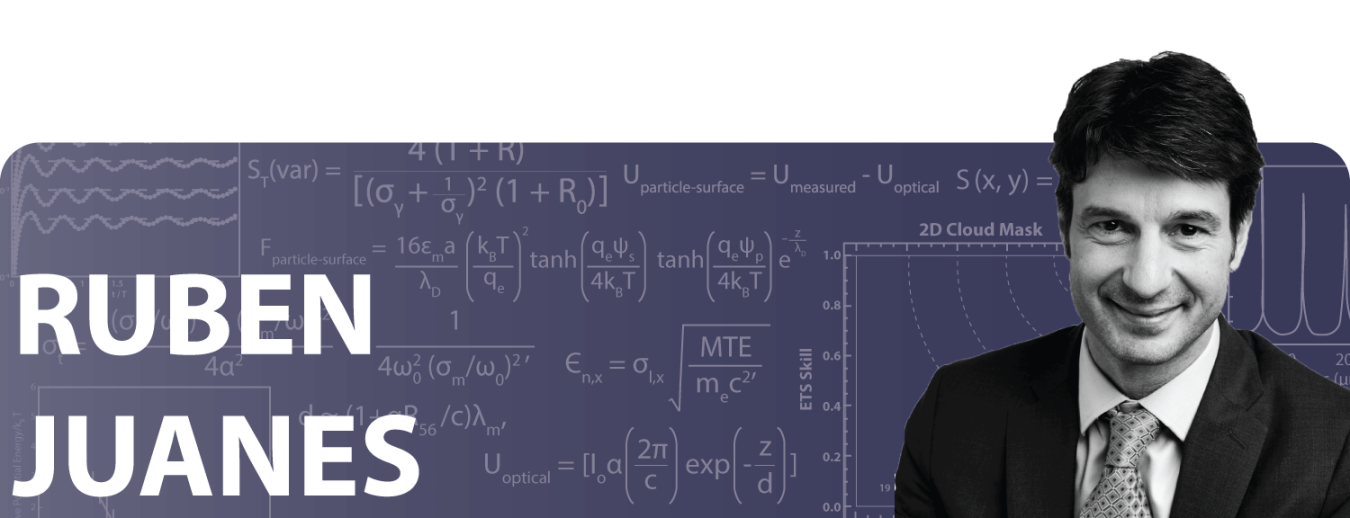Ruben Juanes’ Early Career Award helped develop a program to investigate fundamental mechanisms of fluid-fluid displacement in porous media.
January 31, 2020
WHAT DID THE 2010 EARLY CAREER AWARD ALLOW YOU TO DO?
My research focuses on understanding and modeling the physical processes associated with how multiple fluids flow simultaneously in porous geological media. My work is motivated by important engineering problems including the enhancement of oil recovery (from producing reservoirs), large-scale storage of carbon dioxide (in depleted reservoirs), and water infiltration in soil.
One of my most widely recognized contributions has been in the area of CO2 sequestration. I have elucidated the underlying mechanisms controlling trapping of CO2 in saline aquifers and applied this knowledge to assess the long-term potential of carbon capture and storage as a technological solution for mitigating effects of climate change.
Supported by the DOE Early Career award, I have developed an experimental program to investigate fundamental mechanisms of fluid-fluid displacement in porous media. By means of high-resolution imaging in patterned microfluidic flow cells and granular media, I uncovered wetting transitions at the pore scale that underpin the fluid recovery in porous media at the macroscale. These have important implications for the design of oil recovery processes and irrigation systems in arid environments.
ABOUT:
Ruben Juanes is a professor in the Department of Civil and Environmental Engineering and the Director of the Henry L. Pierce Laboratory for Infrastructure Science and Engineering at the Massachusetts Institute of Technology.
SUPPORTING THE DOE SC MISSION:
The Early Career Award program provides financial support that is foundational to young scientists, freeing them to focus on executing their research goals. The development of outstanding scientists early in their careers is of paramount importance to the Department of Energy Office of Science. By investing in the next generation of researchers, the Office of Science champions lifelong careers in discovery science.
For more information, please go to the Early Career Research Program.
THE 2010 PROJECT ABSTRACT:
Nonequilibrium Physics and Phase‐Field Modeling of Multiphase Flow in Porous Media
Understanding complex flow physics remains a major challenge in geosciences and in many other physical sciences and engineering sciences. Modeling subsurface flow patterns requires both improved experimental determinations and better theoretical constructs representing the critical relationships. The innovative new approach in this proposed effort has its origins in the mathematical description of solidification processes. An attractive aspect of the approach is that it lays out hypotheses that are nontrivial and testable by carefully‐designed laboratory experiments. This would be a very important result in soft‐matter physics and in a number of energy system problems such as improved oil and gas recovery, CO2 sequestration, improved efficiency in fuel cells, and improved designs for micro‐fluidic devices, all of which depend on the formation and control of fluid‐fluid instabilities.
RESOURCES:
B. Zhao, C. W. MacMinn, and R. Juanes, “Wettability control on multiphase flow in patterned microfluidics.” Proc. Natl. Acad. Sci. U.S.A. 113, 10251 (2016). [DOI:10.1073/pnas.1603387113]
A.A. Pahlavan, L. Cueto-Felgueroso, G.H. McKinley, and R. Juanes, “Thin films in partial wetting: internal selection of contact-line dynamics.” Physical Review Letters 115, 034502 (2015). [DOI: 10.1103/PhysRevLett.115.034502]
L. Cueto-Felgueroso and R. Juanes, “Macroscopic phase-field model of partial wetting: bubbles in a capillary tube.” Physical Review Letters 108, 144502 (2012). [DOI: 10.1103/PhysRevLett.108.144502]
Additional profiles of the Early Career Research Program award recipients can be found on the Early Career Program Page.
The Office of Science is the single largest supporter of basic research in the physical sciences in the United States and is working to address some of the most pressing challenges of our time. For more information, please visit www.energy.gov/science.
Sandra Allen McLean

Sandra Allen McLean ([email protected]) is a communications specialist for the Office of Science in the Office of Communications and Public Affairs. Sandra is responsible for identifying, curating, or creating lay-language content about Office of Science-funded research for DOE web sites, popular and trade media, and stakeholder education. She researches and writes the historical Milestone Tweets for the office Twitter account @DOEScience.
Sandra holds an associate degree in American Sign Language interpreting, a bachelor’s in science journalism and biology, and a master’s in Information Sciences. Her hobbies are sewing – especially costumes! – and lesesucht, compounded by extreme tsundoku.

